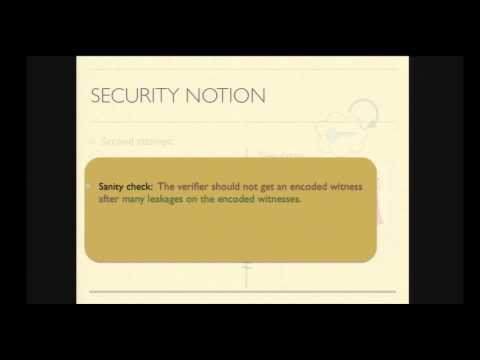Welcome to the resource topic for 2014/660
Title:
Interactive Proofs under Continual Memory Leakage
Authors: Prabhanjan Ananth, Vipul Goyal, Omkant Pandey
Abstract:We consider the task of constructing interactive proofs for NP which can provide meaningful security for a prover even in the presence of continual memory leakage. We imagine a setting where an adversarial verifier participates in multiple sequential interactive proof executions for a fixed NP statement x. In every execution, the adversarial verifier is additionally allowed to leak a fraction of the (secret) memory of the prover. This is in contrast to the recently introduced notion of leakage-resilient zero-knowledge (Garg-Jain-Sahai’11) where there is only a single execution. Under multiple executions, in fact the entire prover witness might end up getting leaked thus leading to a complete compromise of prover security. Towards that end, we define the notion of non-transferable proofs for all languages in NP. In such proofs, instead of receiving w as input, the prover will receive an "encoding’’ of the witness w such that the encoding is sufficient to prove the validity of x; further, this encoding can be "updated’’ to a fresh new encoding for the next execution. We then require that if (x,w) are sampled from a "hard’’ distribution, then no PPT adversary A* can gain the ability to prove x (on its own) to an honest verifier, even if A* has participated in polynomially many interactive proof executions (with leakage) with an honest prover whose input is (x,w). Non-transferability is a strong security guarantee which suffices for many cryptographic applications (and in particular, implies witness hiding). We show how to construct non-transferable proofs for all languages in NP which can tolerate leaking a constant fraction of prover’s secret-state during each execution. Our construction is in the common reference string (CRS) model. To obtain our results, we build a witness-encoding scheme which satisfies the following continual-leakage-resilient (CLR) properties: - The encodings can be randomized to yield a fresh new encoding, - There does not exist any efficient adversary, who receiving only a constant fraction of leakage on polynomially many fresh encodings of the same witness w, can output a valid encoding provided that the witness w along with its corresponding input instance x were sampled from a hard distribution. Our encoding schemes are essentially re-randomizable non-interactive zero-knowledge (NIZK) proofs for circuit satisfiability, with the aforementioned CLR properties. We believe that our CLR-encodings, as well as our techniques to build them, may be of independent interest.
ePrint: https://eprint.iacr.org/2014/660
Talk: https://www.youtube.com/watch?v=nYXwwtDxaco
See all topics related to this paper.
Feel free to post resources that are related to this paper below.
Example resources include: implementations, explanation materials, talks, slides, links to previous discussions on other websites.
For more information, see the rules for Resource Topics .
